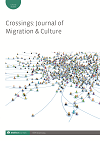
Full text loading...

A migrant camp is a ‘non-place’ where personal identity is put at risk. Music is a means of personal adaptation in camps, even if it means allowing little place for the real reasons for displacement of the very people shaping these new hybridizations of music. The present power of music in such a place is to create strong relationships, ‘shortcutting’ both narration and the longer time needed in order to create relationships. The kind of personal advantage it is for someone to be a musician is a topic surprisingly forgotten, obscured by theoretical habits of seeing music essentially as an expressive activity directed to an audience, or as being a communicative activity. Music has a performative power different from language, as a non-verbal art having a strong and direct relationship to the body. Musical interactions on the field give migrants the ability to balance their problematic situation of refugees, shaping a real present.

Article metrics loading...

Full text loading...
References


Publication Date:
https://doi.org/10.1386/cjmc_00036_1 Published content will be available immediately after check-out or when it is released in case of a pre-order. Please make sure to be logged in to see all available purchase options.